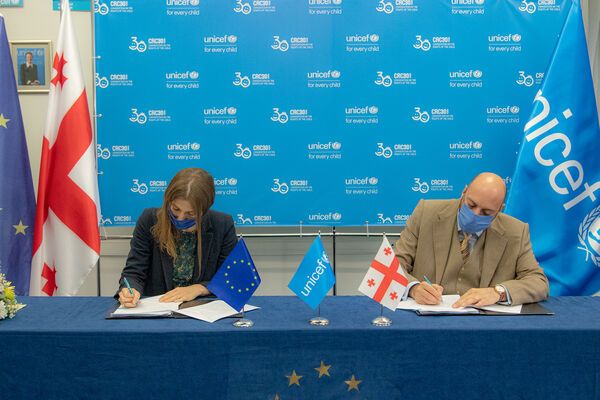
European Union and UNICEF launch Joint Initiative for Children’s Rights in Georgia
The new three-year project supported by the European Union will strengthen capacities of child protection and justice systems to protect the rights of children.
Children in Georgia will have improved understanding, protection and realization of their rights thanks to a new project that was signed today between the European Union and UNICEF. The project will support children to live in a protective and caring family environment and have better access to child-friendly justice.
Within the Human Rights Week the Sigrid Brettel, Head of Cooperation, EU Delegation to Georgia and UNICEF Representative in Georgia, Ghassan Khalil signed an agreement to kick off the new initiative to improve child protection national system in Georgia.
It aims to support the Government in the implementation of the newly adopted Code on the Rights of the Child including in decentralization of activities to facilitate improved action within communities to respect and protect the rights of children.
The project ‘Strengthening Systems and Services for Child Protection in Georgia” will be implemented by UNICEF, in partnership with the Government of Georgia, with financial support from the European Union, over the next three years with a total budget of over Euro 2 million.
“The EU has been supporting children’s rights in Georgia for many years, including our recent work with UNICEF contributing to the development of Georgia’s Child Rights Code.
We are happy today to announce our continued cooperation with UNICEF to further support the Georgian institutions to provide better services and care to children and families in vulnerable situations,” – said Sigrid Brettel, Head of Cooperation at the EU Delegation to Georgia.
“We are grateful to the European Union for their continued support to strengthening child rights, child protection and justice systems in Georgia”, said Ghassan Khalil, UNICEF Representative in Georgia. “The new Code on the Rights of the Child that came into force earlier this year provides a comprehensive legal framework and brings the child protection system into compliance with international standards. The project that has been launched with the support of the European Union will contribute to the application of the main principles of the Code in practice and will ensure children live in a caring family environment and have access to child-friendly justice”.
The COVID-19 pandemic brought new challenges for children and families. Pandemic-related restrictions and the expected loss of jobs increase family vulnerabilities and risks for children. This project will contribute to increased protection of the rights of children during and after the pandemic.
Additionally, the project will
strengthen legislation and policies to support closure or restructuring of specialized institutions and move children from these institutions to a family environment. It will also strengthen social services workforce at central and municipal levels to support and protect children and families;
- develop needs-based social programmes and implement them at local municipalities’ level. Specific communication interventions will promote positive parenting to address violence against children.
In the justice sector the project will result in additional specialization of criminal justice professionals (police, prosecutors, lawyers, judges) to work with child victims/witnesses of crime and those involved in cases of separation of children from their families. It will also strengthen the Juvenile Referral Centre and develop rehabilitation services for children based on international child rights standards.
Additional Information
Since 2005, the Government of Georgia, with the support of the European Union, UNICEF, other donors and state and non-state partners, has been implementing Child Welfare System reform, which significantly reduced the number of children in large-scale state-run institutions from 4,100 in 2005 to 77 in 2020. More than 900 children remain in non-state institutions. Violence against children in families, residential care, foster care and educational institutions remain a significant problem with 69 per cent of children experiencing violent discipline, with many believing that the use of physical violence against children is acceptable and that physical forms of punishment are more effective than non-violent parenting techniques.
Since 2009, significant progress has been made in reforming the juvenile justice system in Georgia with the support of the EU. The reform produced tangible results for children in conflict with the law, but additional focus is needed to prevent juvenile crime. Since its introduction in 2010 the Diversion programme has helped more than 4,000 children and young people but there is a need to introduce a wide range of rehabilitation services for diverted juveniles and strengthen coordination between different professionals.
***
For further information, please contact:
Tamriko Mikadze, Press and Information Officer, Delegation of the European Union to Georgia, tamriko.mikadze@eeas.europa.eu
Maya Kurtsikidze, UNICEF Georgia Communication Officer, Tel: +995 599 533071, mkurtsikidze@unicef.org, www.unicef.org/georgia, Follow us on Twitter and Facebook




